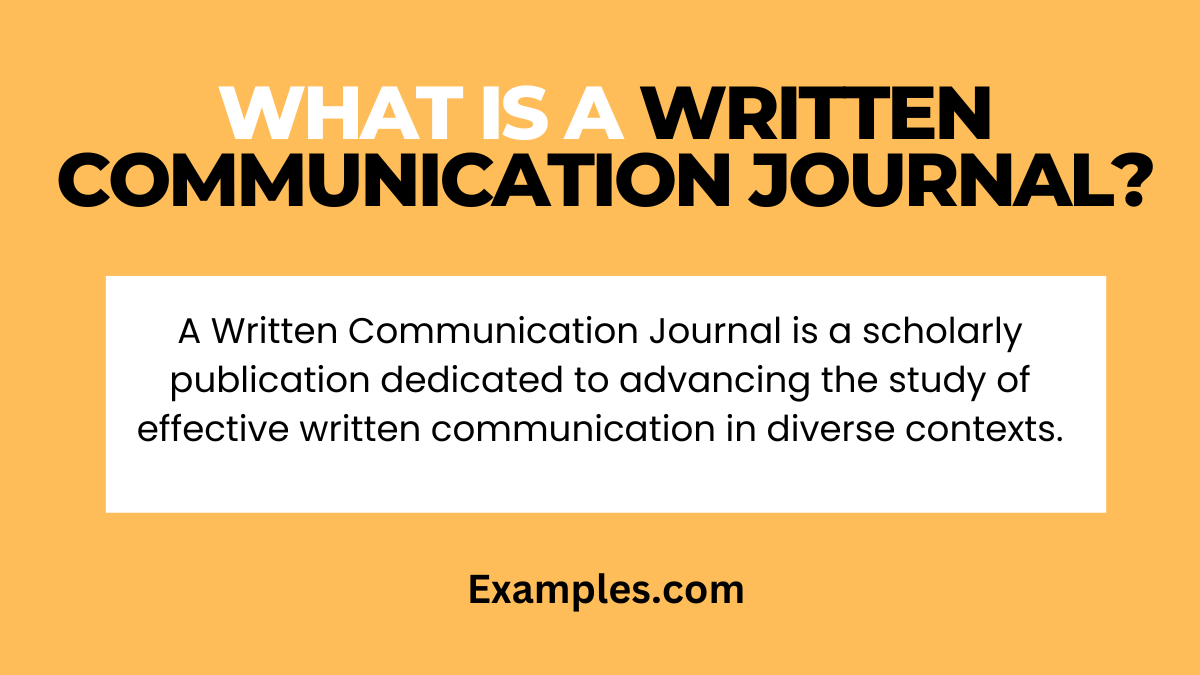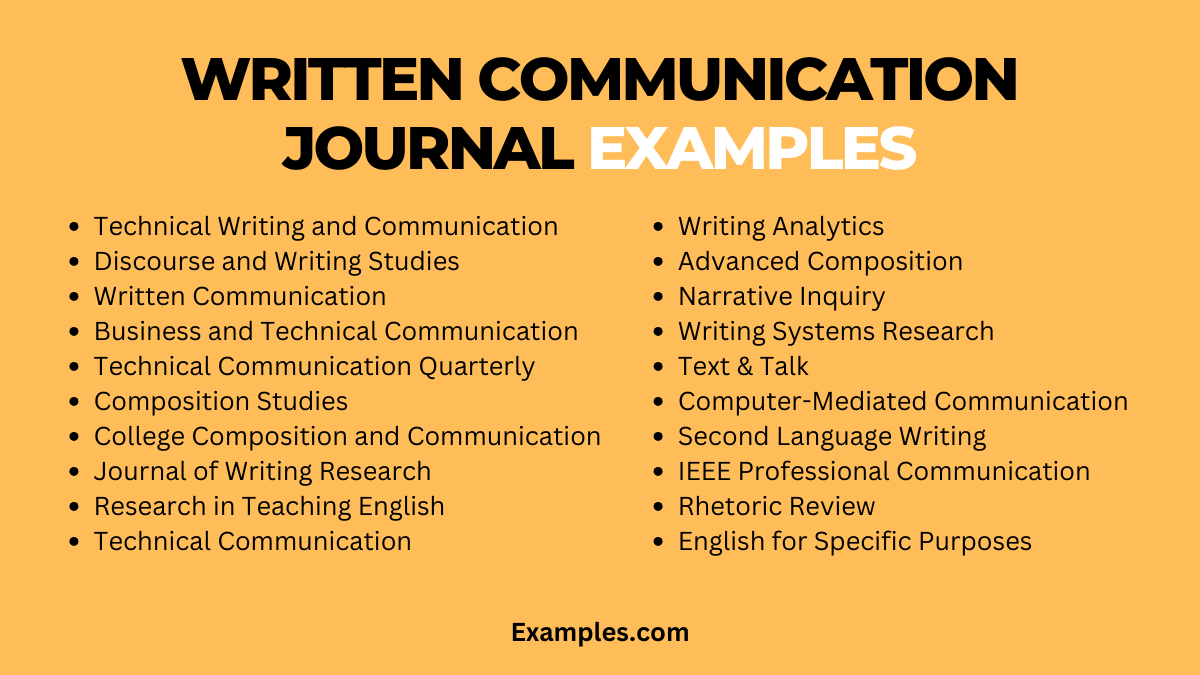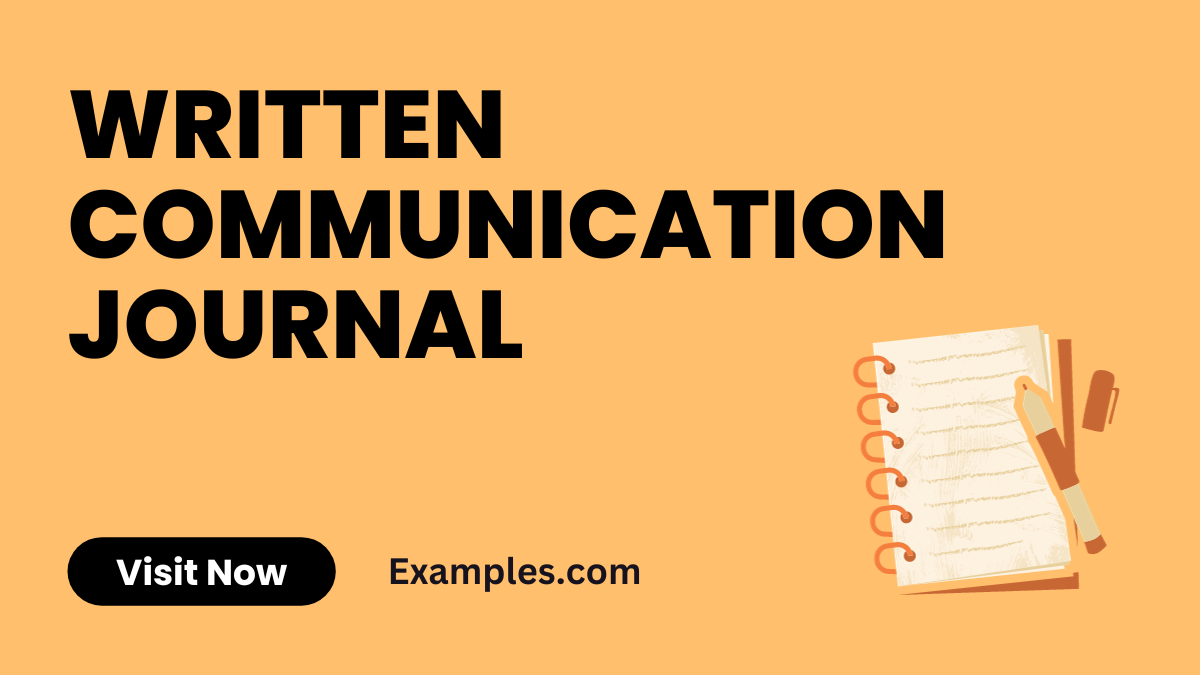19+ Written Communication Journal Examples
Dive into the world of Written Communication Journal, a comprehensive resource filled with various Communication Examples designed to improve and inspire your writing. This guide provides insights into effective writing practices, showcases exemplary models, and explores the impact of well-crafted written communication in various fields. Perfect for students, professionals, and anyone looking to enhance their written expression, this guide is a treasure trove of information and inspiration. Incorporating journal templates can make the process of applying these techniques more organized, helping you structure your journals effectively while boosting creativity.
What is a Written Communication Journal? – Meaning

A Written Communication Journal is a scholarly publication focusing on the study and advancement of written communication. It includes articles, research findings, and communication examples related to the effectiveness, methodology, and analysis of writing in various contexts. Such journals serve as a critical resource for academics, professionals, and students seeking to understand and improve their written communication skills.
What is the Best Example of Written Communication Journal?

The best example of a Written Communication Journal might be one that consistently provides cutting-edge research, comprehensive studies, and practical applications related to written communication. It would include peer-reviewed articles on topics ranging from rhetorical analysis and discourse studies to practical tips on improving writing skills, serving as an authoritative source for the latest insights and developments in the field of written communication.
20 Written Communication Journal Examples

Explore 20 dynamic Written Communication Journal examples, each shedding light on the nuances of effective writing. From academic research to professional discourse, these examples illustrate the breadth and depth of written communication. Understand the causes behind common writing challenges and discover strategies for enhancing clarity, engagement, and impact in your written work. This selection is a must-read for anyone looking to refine their writing skills or gain insights into the ever-evolving world of written communication.
- Journal of Technical Writing and Communication: Specializes in technical and scientific communication.
- Discourse and Writing/Rédactologie: Focuses on the study of writing in professional and academic settings.
- Written Communication: Covers a broad range of topics in writing research and methodology.
- Journal of Business and Technical Communication: Concentrates on business and technical writing practices.
- Technical Communication Quarterly: Explores the latest in technical communication strategies and trends.
- Composition Studies: Dedicated to the art and pedagogy of writing.
- College Composition and Communication: Discusses issues concerning writing at the college level.
- Journal of Writing Research: Offers insights into writing processes and instruction.
- Research in the Teaching of English: Covers a variety of topics related to English writing and teaching.
- Technical Communication: The journal of the Society for Technical Communication.
- Journal of Writing Analytics: Focuses on the analysis of writing processes and products.
- Journal of Advanced Composition: Explores theoretical issues in writing.
- Narrative Inquiry: Deals with narrative methods and writing forms.
- Writing Systems Research: Specializes in the study of writing systems and their impact on society.
- Text & Talk: An interdisciplinary journal focusing on discourse and communication.
- Journal of Computer-Mediated Communication: Discusses the role of technology in written communication.
- Journal of Second Language Writing: Focuses on writing in a second language context.
- IEEE Transactions on Professional Communication: Covers professional and technical communication in engineering.
- Rhetoric Review: Theoretical and practical discussions on rhetoric and writing.
- English for Specific Purposes: Focuses on writing and communication in specific professional contexts.
Written Communication Journal in the Workplace
Optimize workplace communication with insights from Written Communication Journal in the Workplace. These journals are pivotal in understanding the importance of written communication at work, offering Written Communication Examples and showcasing the Characteristics of Written Communication that lead to successful collaboration and productivity.
- “Effective immediately, all staff meetings will be held on Thursdays.” – Clarifies a new directive. Ensure directives are clear and direct to avoid confusion.
- “Please submit the completed report by the end of this week.” – Sets a clear deadline. Use specific time frames to ensure timely submissions.
- “Congratulations on successfully leading the project to completion!” – Acknowledges accomplishments. Express appreciation to motivate and encourage continued success.
- “I have attached the minutes from today’s meeting for your reference.” – Provides records. Offer complete and accurate records for future reference.
- “Your feedback on the proposal is welcome and valuable.” – Invites collaboration. Encourage open communication and input for continual improvement.
Written Communication Journal in Development
Explore the role of Written Communication Journal in Development to understand how written communication aids in personal and professional growth. These journals highlight transformative Written Communication Sentence Examples and discuss the ongoing importance of written communication in evolving workplaces and personal skill sets.
- “Join our workshop to enhance your communication skills next month.” – Promotes development opportunities. Highlight opportunities for growth to encourage participation.
- “Recent feedback indicates a need for further training in report writing.” – Addresses skill gaps. Use feedback constructively to identify and address areas for improvement.
- “This quarter, we will focus on improving interdepartmental communications.” – Sets a developmental goal. Clearly define areas for development to guide efforts.
- “Mentorship has been introduced to support your professional journey.” – Offers support. Provide resources and support to aid in continuous development.
- “Continuous improvement is our priority, reflected in our communication standards.” – Reinforces commitment. Reiterate the importance of ongoing development and excellence.
Written Communication Journal for Research Paper
Written Communication Journal for Research Paper delves into the academic rigor and precision required in scholarly writing. This guide provides invaluable written communication examples specifically tailored for researchers, discussing the importance of written communication in disseminating findings and the characteristics of written communication vital for academic impact.
- “This study expands on the theory that…” – Introduces research focus. Begin with a clear statement of your research’s contribution to the field.
- “Data was collected using a stratified sampling method.” – Describes methodology. Clearly outline your methods for transparency and reproducibility.
- “Results indicate a significant correlation between…” – Presents findings. Ensure results are presented clearly and concisely for reader comprehension.
- “Further research is required to explore the implications of…” – Suggests future study. Highlight areas for further investigation to encourage ongoing inquiry.
- “This research contributes to the field of…” – States significance. Concisely communicate the impact and relevance of your research to the wider field.
What is the Primary Focus and Scope of the Written Communication Journal?
The Written Communication Journal primarily aims to explore and disseminate research and knowledge about written communication’s role, effectiveness, and innovation across various fields like Written Communication in Workplace, Written Communication in Nursing, Written Communication in Healthcare, and Written Communication in Schools.
- Exploring Effective Practices: Delving into the best practices that enhance clarity and effectiveness in written communication across fields.
- Researching Writing Processes: Investigating the cognitive and social processes involved in writing.
- Evaluating Tools and Technologies: Examining the impact of digital tools on writing quality, collaboration, and learning.
- Discussing Genre and Style Adaptations: Analyzing how different fields adapt written communication to suit specific genres and audiences.
- Addressing Challenges in Writing Education: Offering insights into teaching and improving writing skills at all educational levels.
What is the Impact Factor of a Written Communication Journal?
The impact factor of a Written Communication Journal reflects its relevance and influence in the field, measuring how frequently its articles are cited in other scholarly works, thus impacting Written Communication in Workplace, Written Communication in Nursing, Written Communication in Healthcare, and more.
- Citation Analysis: Understanding how often articles published in the journal are cited by other works.
- Quality of Research: Assessing the depth, innovation, and rigor of the research published.
- Influence on the Field: Gauging the journal’s role in shaping trends and discussions in written communication.
- Comparative Ranking: Positioning the journal against others in the same field or subject area.
- Yearly Variations: Observing how the impact factor may change over time and what influences these trends.
Business Written Communication Journal
In the realm of written communication, Business Communication plays a pivotal role. The Impact of Business Communication cannot be overstated. It streamlines operations, strengthens relationships, and enhances productivity. Clear and concise messages in emails, reports, and other documents ensure that ideas are conveyed accurately, reducing misunderstandings and fostering collaboration. In the ever-evolving business landscape, mastering this skill is essential for success and growth.
What is the Purpose of the Written Communication Journal?
The Written Communication Journal aims to enhance Written Communication in Education, fostering skills in the classroom and guiding on how to Improve Written Communication.
What Topics are Covered in a Written Communication Journal?
Topics include strategies for effective Written Communication in the Classroom, educational methodologies, and practical tips to improve written communication skills across disciplines.
How frequently is the Written Communication Journal published?
The journal is typically published periodically, focusing on the evolving practices of written communication in educational settings.
In conclusion, this article has examined the crucial aspects of written communication, including examples, effects, signs of both effective and ineffective communication, and practical steps to improve it. Effective written communication fosters understanding, collaboration, and productivity, while its failure can lead to misunderstandings and conflicts. By recognizing the signs and following the suggested strategies, individuals and organizations can enhance their written communication skills for better outcomes in various contexts.



